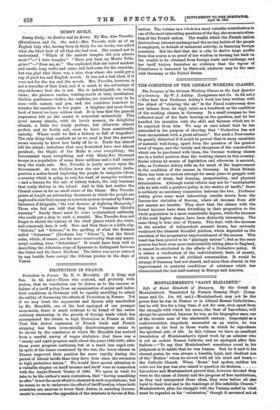Protection in France. By H. 0. Meredith. (P. S. King
and Son. 3s. 6d. not.)—Thoso who contend, and probably with justice, that no conclusion can be drawn as to the success or failure of a tariff policy from an examination of social and indus- trial conditions in Germany will be equally unwilling to admit the utility of discussing the effects of Protection in France. Yet if we may trust the arguments and figures ably marshalled by Mr. Meredith, one of the best equipped of our younger economists, there is much evidence to be found of the extra- ordinary slackening in the growth of foreign trade which has accompanied the return to high Protection in France in 1892. That this slower expansion of French trade and French shipping has been economically disadvantageous seems to be shown by the conclusion at which Mr. Meredith has arrived from a careful survey of wages statistics : that there was a " steady and rapid progress until about the years 1885-1888; after those years progress continues, but at a much less rapid rate. In spite of the losses occasioned by the war, the lower classes in France improved their position far more rapidly during tho period of liberal tariffs than they have done since the reversion to high protective duties." We would draw special attention to a valuable chapter on tariff treaties and tariff wars in connection with the Anglo-French Treaty of 1860. We agree in what we take to be the author's main contention, that "having something to offer" is not the most effective element in such negotiations ; but he seems to us to underrate the effect of tariff treaties, where both countries are anxious to lower their duties, in assisting Govern- ments to overcome the opposition of the interests in favour of Pro- - - tection. The volume as a whole is a most valuable contribution to one of the most interesting questions of the day, the economic situa- tion of the French nation. The wealth which the French nation derives from internal exchange and the saving habits of the people is employed, in default of industrial activity, in financing foreign countries. But the fact that she is able to derive large profits from this source is no proof of her wisdom in turning her back on the wealth to be obtained from foreign trade and exchange, and her tariff history furnishes no evidence that the vigour of Frenchmen is increased by State-aid, whatever may be the caso with Germany or the United States.


















































 Previous page
Previous page